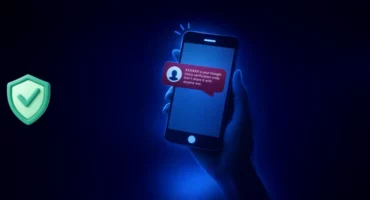Is Grindr Safe? A Closer Look at Safety Concerns and Protective Measures
While Grindr is one of the most popular LGBTQ+ dating apps (with nearly 11 million active monthly users), it comes with particular security risks one shouldn’t neglect. When using this application, it’s important to be aware of the potential threats and learn how to avoid them. Keep reading this article to find out the main concerns associated with Grindr and explore the most effective ways to stay safe.

How safe is Grindr?
Let’s not beat around the bush and answer the main question first – is Grindr safe and private?
Sadly, like many other dating or hookup app platforms, such as Tinder, Bumble, and OkCupid, Grindr is rather unsafe. The reason is that these kinds of platforms act as a treasure trove to hackers, scammers, and online predators who want to break the security of the user, take their personal data or blackmail them. Furthermore, some researchers claim that Grindr has significant vulnerabilities allowing third parties to deanonymize and track users.
Now, what are the risks of Grindr, exactly? Let’s explore some details to answer this question.
Grindr security issues
These are the most popular cybersecurity issues that you can face when using Grindr.
Privacy concerns
Grindr collects and stores large amounts of user data (just like many other free applications do), which can compromise the user’s identity if not handled properly. It includes the following:
- Your email and/or phone number
- The information in your profile (name, date of birth, interests etc.).
- Your geolocation
- In-app interactions and cookies
- Information about your device
The main question here is how the app uses this information. And unfortunately, Grindr’s privacy policy is getting vague at this point. This lack of transparency allows the platform to sell customer data to third parties – most often, these are ad agencies. Also, your private information can be used for training artificial intelligence (AI) tools.
Data exposure
The first well-known Grindr data breach occurred in 2018. Following an examination of the data leaks on the app, security experts made the conclusion that the app was sharing sensitive medical information of the users (such as HIV statuses) with third parties.
And the Grindr privacy issues don’t end here. Another breach resulted in an enormous $11.7 million fine the platform faced due to the decision of Norway’s Data Protection Authority. At the beginning of 2021, it claimed that Grindr’s privacy policy didn’t comply with the General Data Protection Regulation (GDPR) – the main law regarding digital privacy in the European Union.
Although GDPR is only applicable to EU countries, users from all over the world should remain cautious regarding the information they potentially share with third parties when creating a Grindr account.
Hacks and scams
Users of popular social media and dating applications like Grindr often fall victim to various types of fraud. Scammers may use impersonation or another social engineering technique to lure you into a false sense of security and make you reveal some sensitive data, expose your credentials, or click a malicious link.
Catfishing and romance scam are the most widespread fraudulent behaviors on Grindr. Here are some of the details.
- Catfishing. This common Grindr security risk involves building trust and establishing an emotional connection with a victim to later trick them into revealing some private information. Usually, scammers use bots and fake profiles to target unsuspecting victims. You can learn how to recognize a dating app bot here. Also, researchers have recently spotted a so-called “reverse catfishing” scam on Grindr. A malicious actor tries to convince users to register on a fake “LGBTQ+ people protection” website that, in fact, steals their private details.
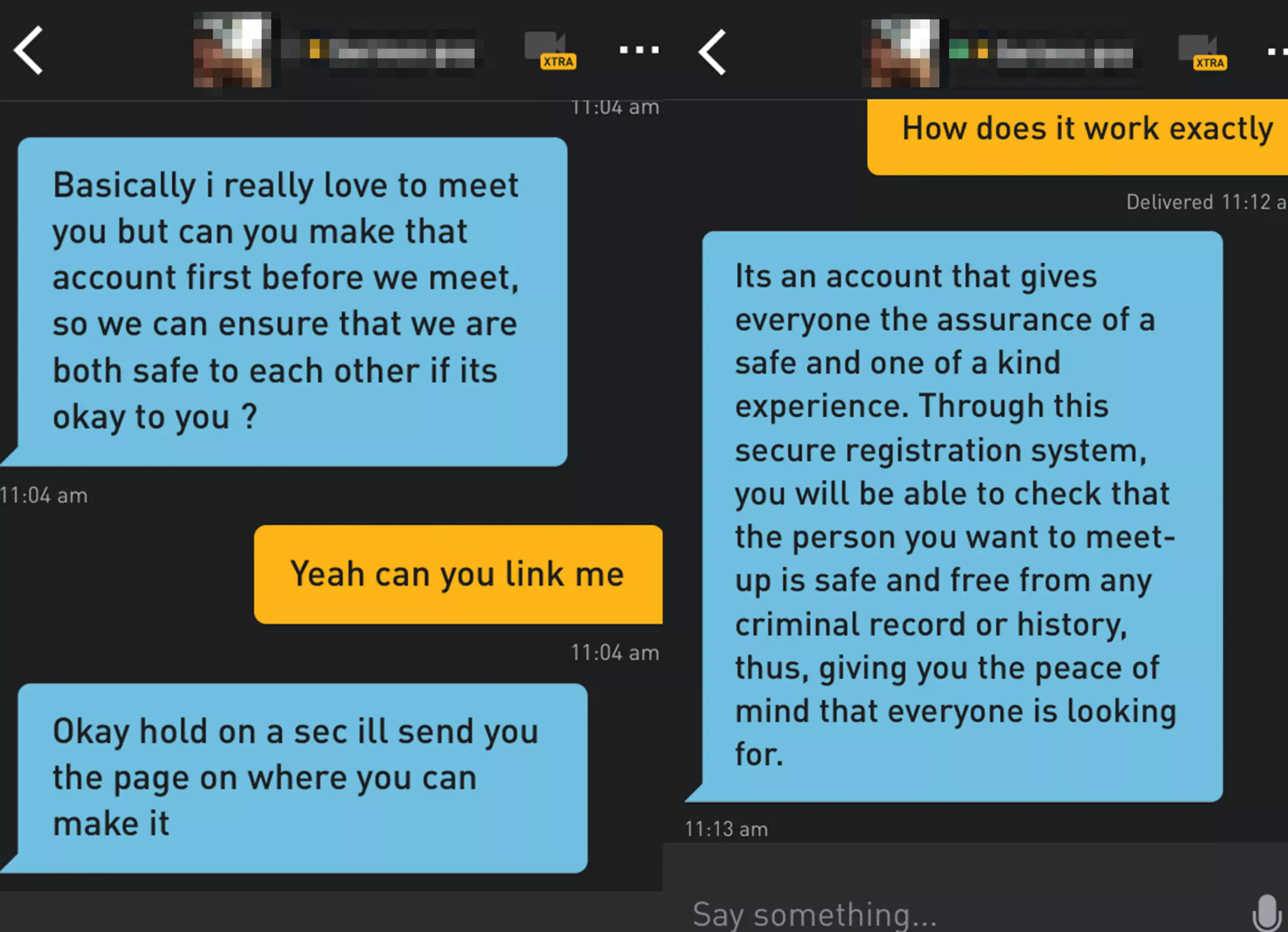
- Romance scams. Scammers often use Grindr to deceive those looking for romantic relationships online. A malicious actor could pretend to be a potential partner – but at some point, innocent flirting may turn into extortion or identity theft. In some cases, fraudsters encourage their victims to invest in fake crypto schemes, ask to reveal online banking credentials, or request a loan to help solve some fictitious problem (and then disappear with the stolen data or funds).

You can check out Grindr’s comprehensive overview of various scams often targeted against the app users here.
💡 Pro tip: Be careful not only when using Grindr itself, but also when receiving any emails pretending to be sent by the app’s support team. Such an alert may appear to be a phishing attempt. Once you click the provided link (for instance, to restore your access to your Grindr account or change the password), it will take you to a shady website to compromise your private data.
Location monitoring
As noted, the most sensitive kind of information that you give Grindr is your precise geolocation. Asking this information is normal in dating apps as it gives other users the opportunity to discover who is around them and meet in real life. But it may also be a threat to your physical security. In many cases, people were stalked and harassed because of sharing their location on Grindr, leading them to feel uncomfortable and later share their worst experiences online.
Note that you can hide your actual location on Grindr whenever you want (more on that in a bit).
Cyberbullying, blackmail, and extortion
Users tend to share their photos and videos (including sensitive ones) on Grindr, which leads to some significant security concerns. Other users may have malicious intentions and use this confidential information to blackmail or harass you.
Here are some common dangers to look out for:
- Cyberbullying. Dating apps like Grindr are full of bullies, offenders, and sexual predators targeting innocent users (usually, those who are exploring their sexual orientation or are younger users). And despite Grindr being under the age category of adults only, the platform does not necessarily check the identity of its users, and this is highly dangerous to minors.
- Blackmail and extortion (sextortion). A scammer can request you to send intimate pictures or screen-record a video call to harass you or blackmail you in the future.There are numerous reports of Grindr users about illicit and offensive activities on the app. Unfortunately, the platform’s moderation isn’t enough to prevent all potential risks of this kind.
Now that you’re familiar with the most significant Grindr privacy and security challenges, let’s see if you can adjust the app settings to avoid some of those threats.
How to maintain your privacy on Grindr
Here are some features of Grindr that will allow you to use the platform more securely.
Set a PIN for your account
Setting a PIN on your Grindr account will provide additional protection against getting hacked. It can be done in a couple of easy steps as follows:
- Open Grindr.
- Go to Profile > Settings.
- Scroll down to Security and Privacy.
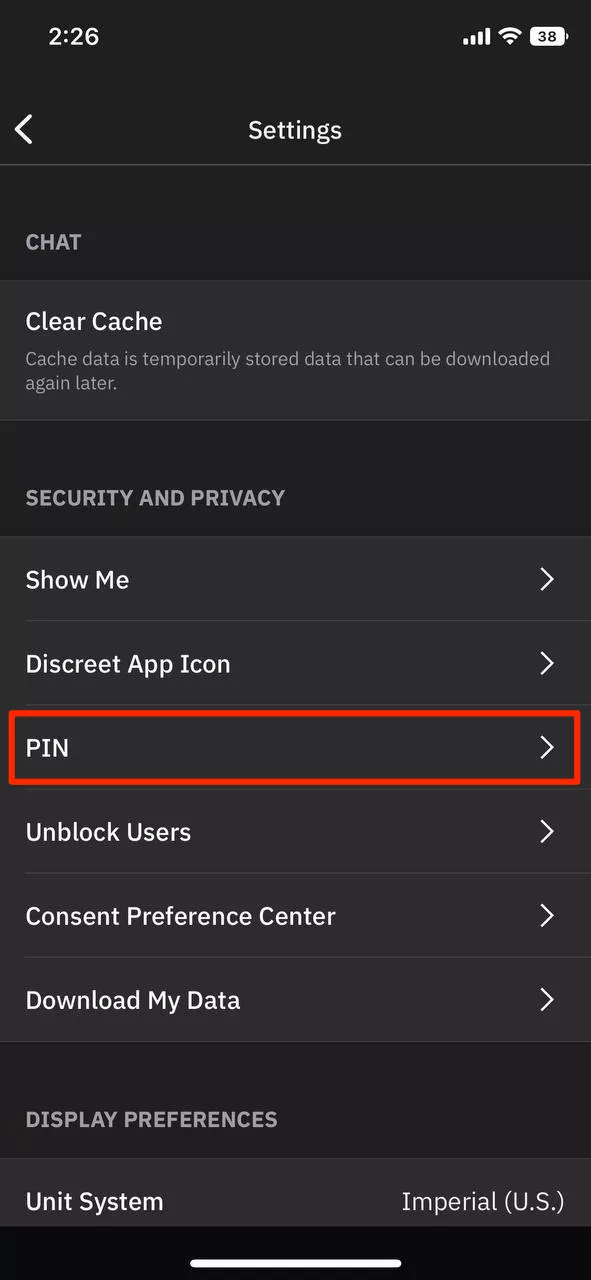
- Tap PIN > Enable PIN.
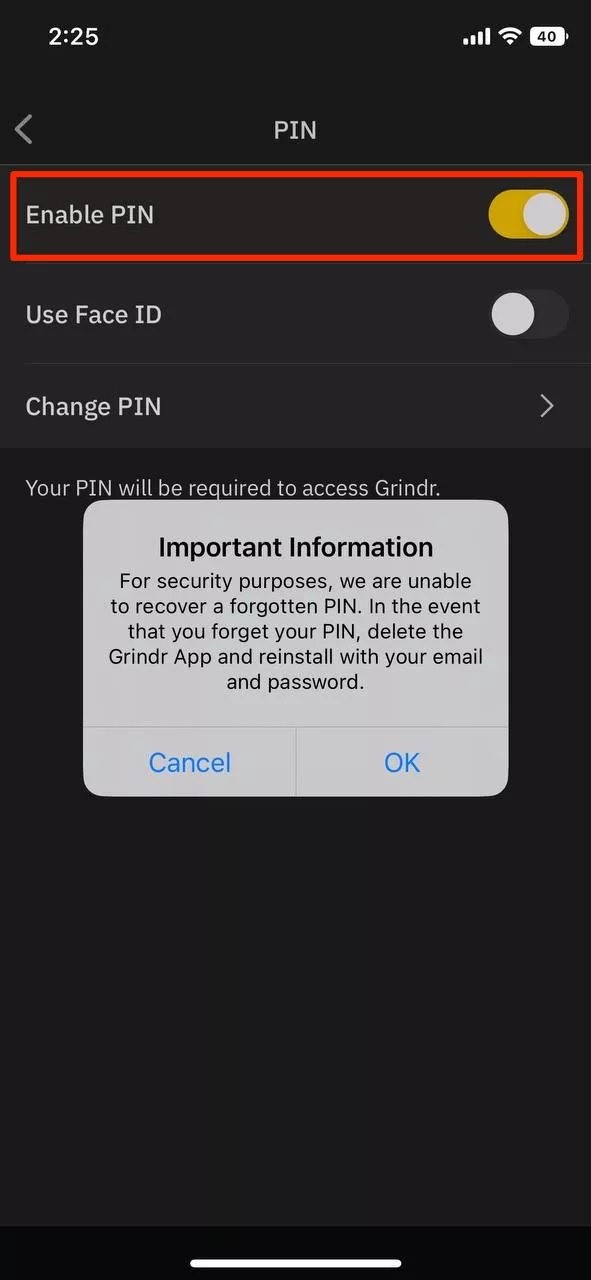
Hide your profile from location-based searches
Disabling the Show Me in Explore Searches feature will make your Grindr profile invisible through searches based on your physical location. Here’s how to enable it:
- Head to Profile > Settings in your Grindr app.
- Open Security and Privacy > Show.
- Toggle off Show Me in Explore Searches.

Hide your profile from the Viewed List on Grindr
In order to clear your profile off the Viewed Lists of other users, do the following:
- Open your Profile > Settings.
- Go to Security and Privacy > Show.
- Toggle off Show Me in Viewed Me List.

Disable the Show Distance feature
Grindr uses the geolocation of the users to indicate their approximate geo-location by indicating the distance between their current geographical points by use of their devices GPS. Here is how to prevent the app from revealing this information:
- Open Grindr and tap Profile > Settings.
- Open Security and Privacy > Distance and Visibility.
- Select Hidden in the Distance section.

Discreet the Grindr app from your device
In case you need to conceal the Grindr application in the menu of your phone because of privacy or any other reasons, follow the steps below:
- Go to Profile > Settings in your Grindr app.
- Open Security and Privacy.
- Select Discreet App Icon and choose the preferred option.

Block and report suspicious Grindr profiles
If you encounter any offensive activity of a particular Girndr user or suspect it’s a bot, you can block this profile and report it to the platform moderators. Here’s how to do it:
- Go to the user’s profile.
- Tap the blocking icon at the top right corner of the screen.
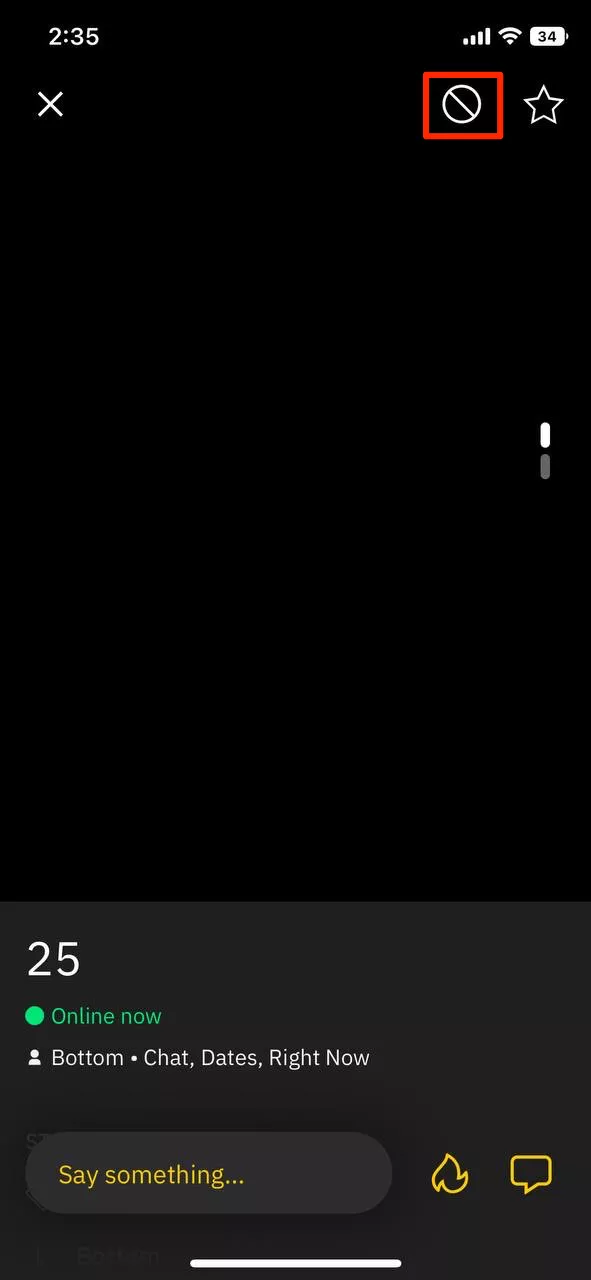
- Select the Block or Report option.

Unfortunately, even if you maintain your privacy on Grindr by adjusting the settings listed above, it doesn’t ensure ultimate safety. The risk of falling victim to a Grindr data breach, scam, or hack is still high, so you may want to take some extra measures to protect yourself.
How to protect yourself on Grindr: 6 simple tips
These are some of the basic but effective things that you can do in order to maintain your own safety and protect your online identity when using Grindr.
1. Don’t overshare your private data
This is the most obvious (yet still essential) tip on the list. Any advanced privacy measures won’t save the day if you’re not using the app carefully. Don’t share any details that may let scammers compromise your personal information or blackmail you. In particular, avoid revealing your address, phone number, and email to strangers. Besides, never expose any confidential data, such as medical and banking information.
2. Avoid suspicious links and potential Grindr bots
As stated, phishing and other malicious methods are frequently focused on Grindr users. That is why one should know how to detect and prevent such frauds. Take note of some of the red flags that are related to social engineering threats.Never open any links that are shared by unfamiliar users. Besides, do not be tempted by too-good-to-be-true offers and unexpected financial advice.
3. Create a strong and unique password
Regularly update the password in your Grindr account to make sure it doesn’t fall into the wrong hands. Also, don’t use the same credentials on different accounts – hackers can use them in a password-stuffing attack. Finally, make sure to use a strong password combining uppercase and lowercase letters, numbers, and symbols. To be extra safe, it would be good to use a password manager software such as LastPass or MacPass that will keep your credentials safe.
4. Share photos without metadata
Every picture you take stores metadata. These small pieces of information reveal the location of a specific photo to anyone with some tech knowledge. So before sending any images to other users on Grindr, make sure to remove this data. On an iOS device, you can do it by tapping the info button and removing location details. On Android, open your Gallery, tap Share, and select the Remove location data option.
5. Stay cautious when going abroad
While the LGBTQ+ community is fully supported in most Western democracies, it might not be the case in some parts of the world. Moreover, the use of Grindr is illegal in several countries, including Iran, Qatar, UAE, Indonesia, Turkey, China, and more. So when going abroad, make sure to check if the app is allowed in the country you’re visiting. Remember that local Internet service providers (ISPs) can detect what you’re doing online if you don’t hide your virtual location.
6. Use a VPN
A quality virtual private network (VPN) service is one of the best methods to secure your online dating and surf freely.It hides your IP from hackers, Internet service providers, and other possible snoopers, giving it the address of a distant server. Besides, a VPN encrypts your traffic, making your activities fully private and untraceable. Finally, such a service is an effective measure against various cyber threats, from phishing attacks to malware and scams.
Here is how to protect your activities on Grindr with a reliable VPN service.
How to use a VPN for Grindr?
- Choose a trustworthy VPN service provider. Not all VPNs are equally safe – some of them actually do more harm than good (especially the ones that promote themselves as free). The problem is that “free” services often make a profit by selling your data to third parties. That‘s why we recommend opting for a reputable paid VPN like VeePN. It follows a transparent No Logs policy, meaning that the service provider doesn’t collect, store, and share your connection and activity details.
- Sign up for VeePN. Once you’ve created your account, select the most suitable pricing plan for your needs.
- Download and install the VeePN app on your device. VeePN is compatible with most platforms and operating systems. In particular, you can choose a VPN for iOS or an Android solution.
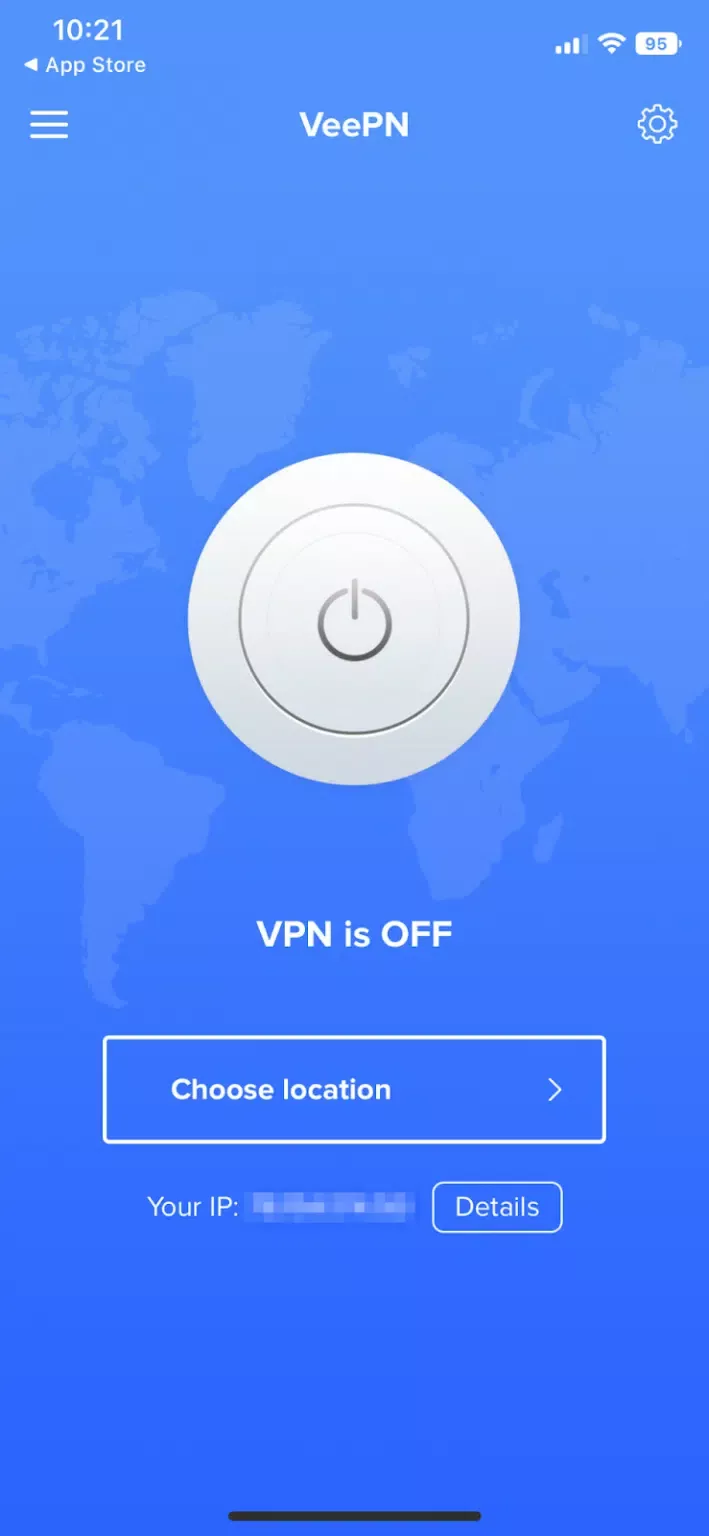
- Run VeePN and connect to a server. VeePN provides more than 2,500 servers in 89 locations of 60 countries. This wide network of servers enables you to enjoy the freedom of browsing with the stability of your connection being maintained and secured. At this point, you replace your real IP address once connecting to a server in the US, Canada, Australia, Spain, Italy, Poland, or else.
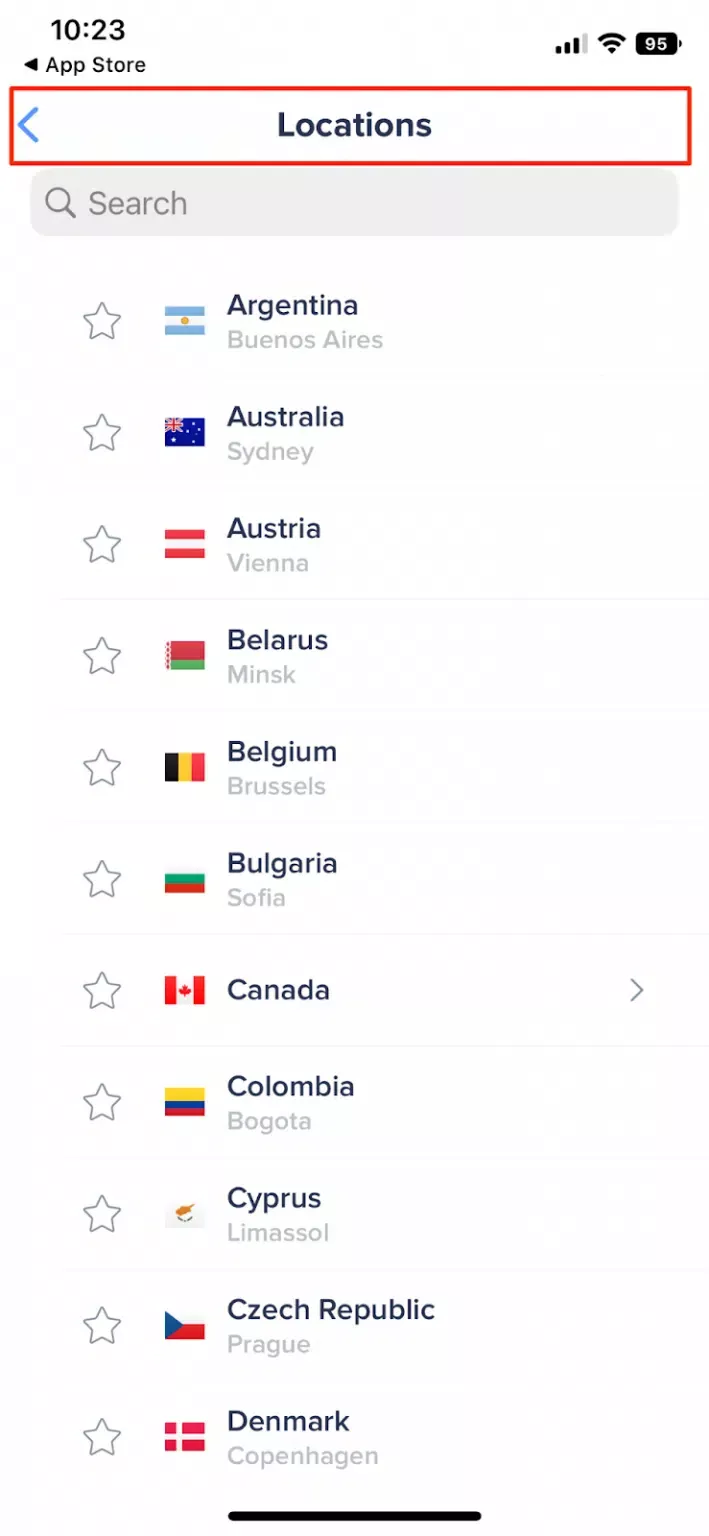
- Turn your VPN on. You can also go to the app settings and enable some additional security and privacy features, including Kill Switch (to prevent potential private data leaks), NetGuard (to block unwanted ads, malware, and third-party monitoring), and more.
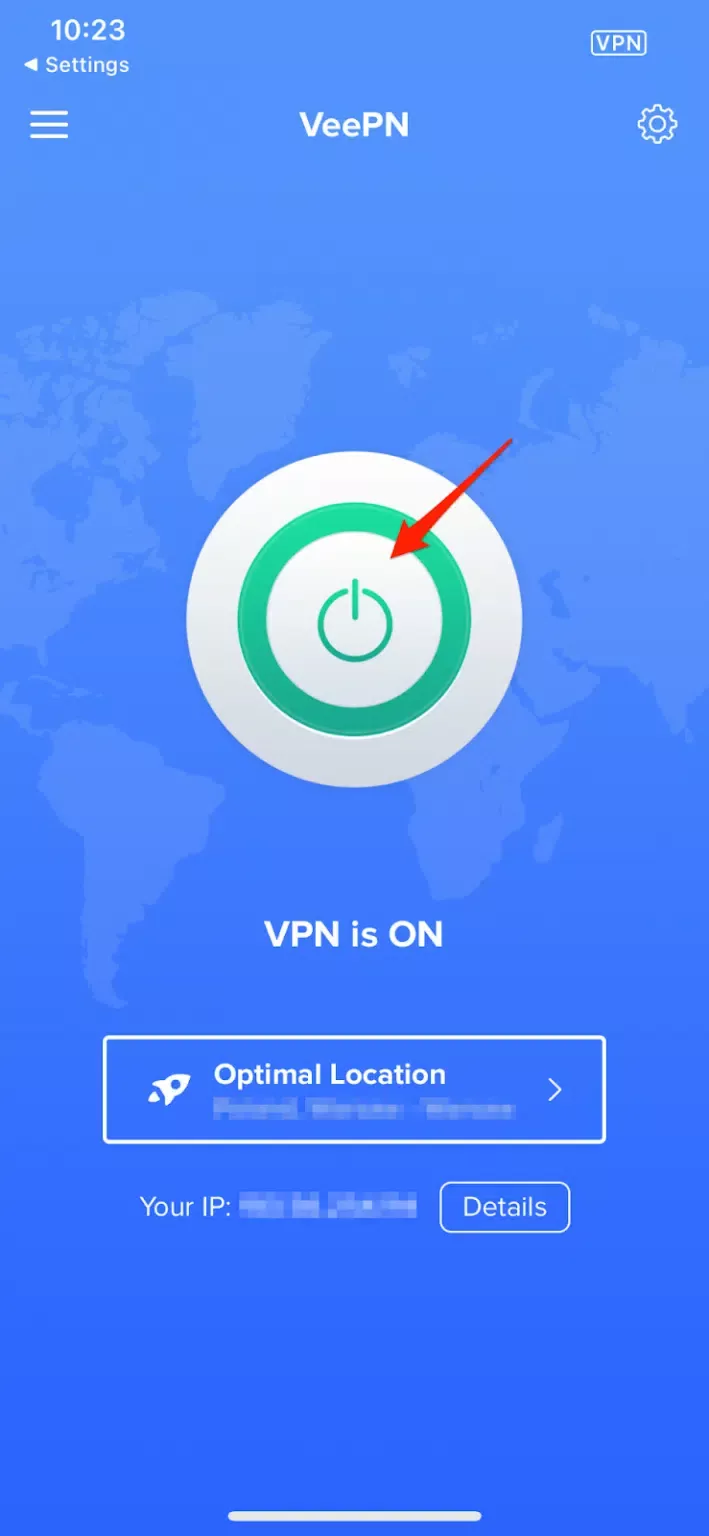
- You’re all set! Open Grindr and enjoy your secure online dating experience.
Try VeePN today risk-free with a 30-day money-back guarantee and date on Grindr without compromising your privacy!
FAQ
Grindr is the most popular online dating application for LGBTQ+ people launched in 2009. It is a geo-social network, which implies that users are located based on your geographical information. The platform enables you to see profiles, chat, exchange photos and videos, have video calls, and geolocation sharing.
Grindr lets users create their profiles and use their device’s GPS to share their location This way, you can see the distance to other Grindr users located near you. On Grindr, you can start a chat with another person, share photos, make calls, and more. All in all, Grindr is similar to other location-based dating apps like Tinder. The main difference is that Grindr is designed for LGBTQ+ people specifically.
Like any other location-based dating app, Grindr is quite unsafe. It poses numerous risks to your cybersecurity, including data collection, potential privacy breaches, scams, location monitoring, cyberbullying, extortion, and more. Read this article to learn more about those risks and possible ways to protect yourself.
Yes. Although Grindr doesn’t show your precise location, it reveals your approximate whereabouts. According to many researchers, it’s quite easy to spot the exact physical location of a Grindr user. Check out this article to learn how to maintain your privacy when using this app.
VeePN is freedom
Download VeePN Client for All Platforms
Enjoy a smooth VPN experience anywhere, anytime. No matter the device you have — phone or laptop, tablet or router — VeePN’s next-gen data protection and ultra-fast speeds will cover all of them.
Download for PC Download for Mac IOS and Android App
IOS and Android App
Want secure browsing while reading this?
See the difference for yourself - Try VeePN PRO for 3-days for $1, no risk, no pressure.
Start My $1 TrialThen VeePN PRO 1-year plan




